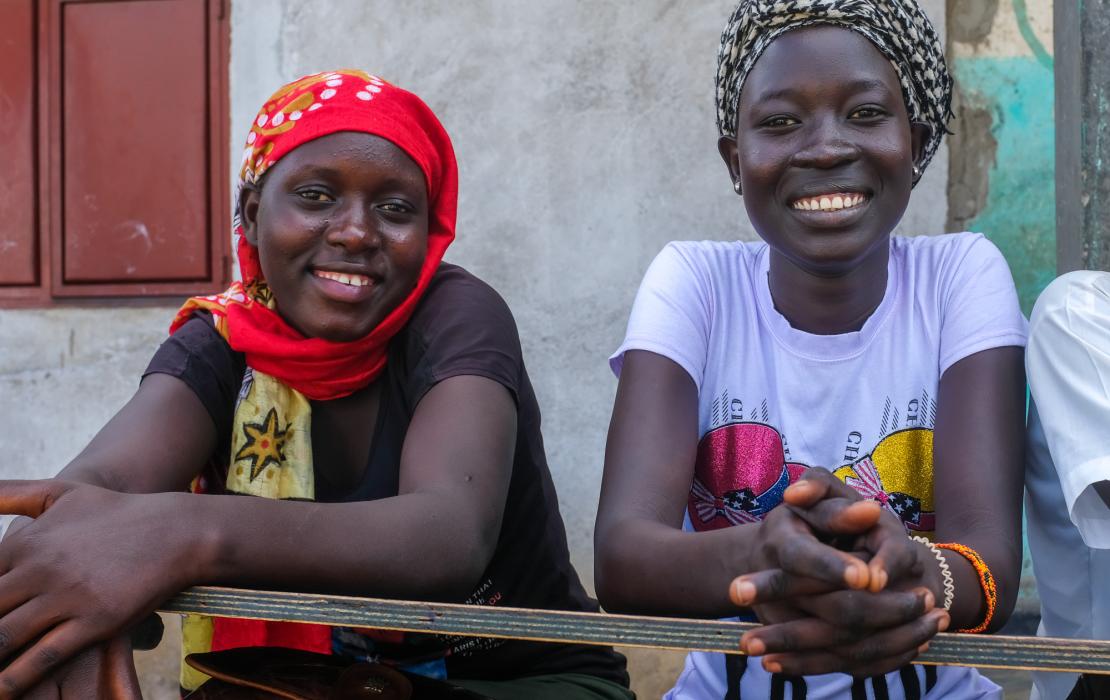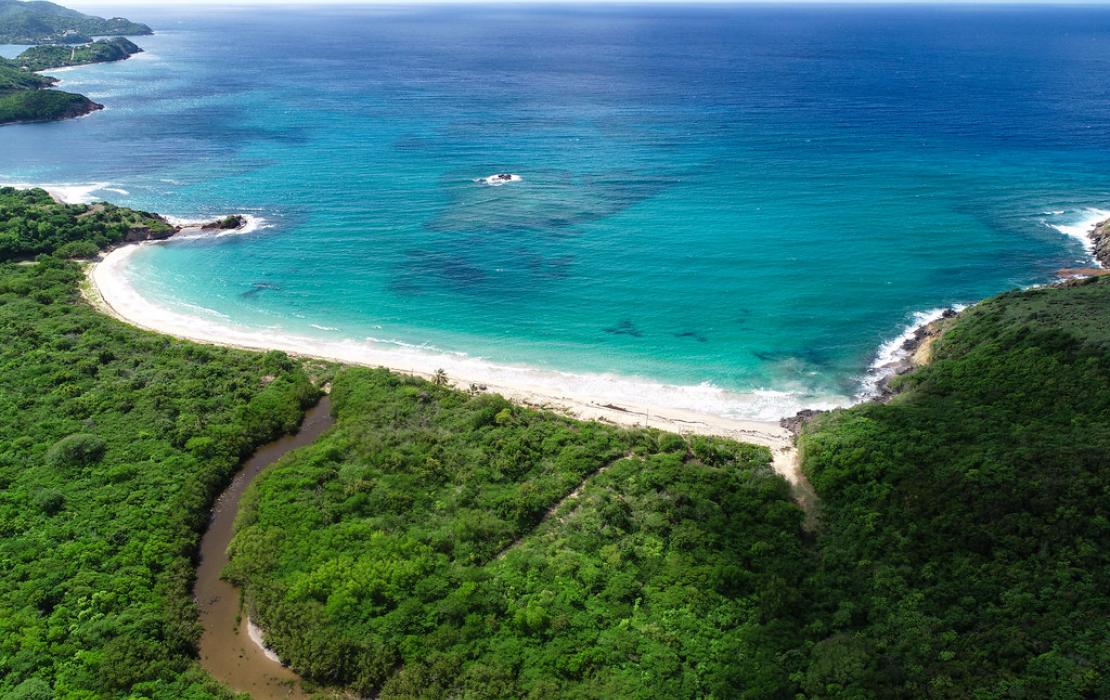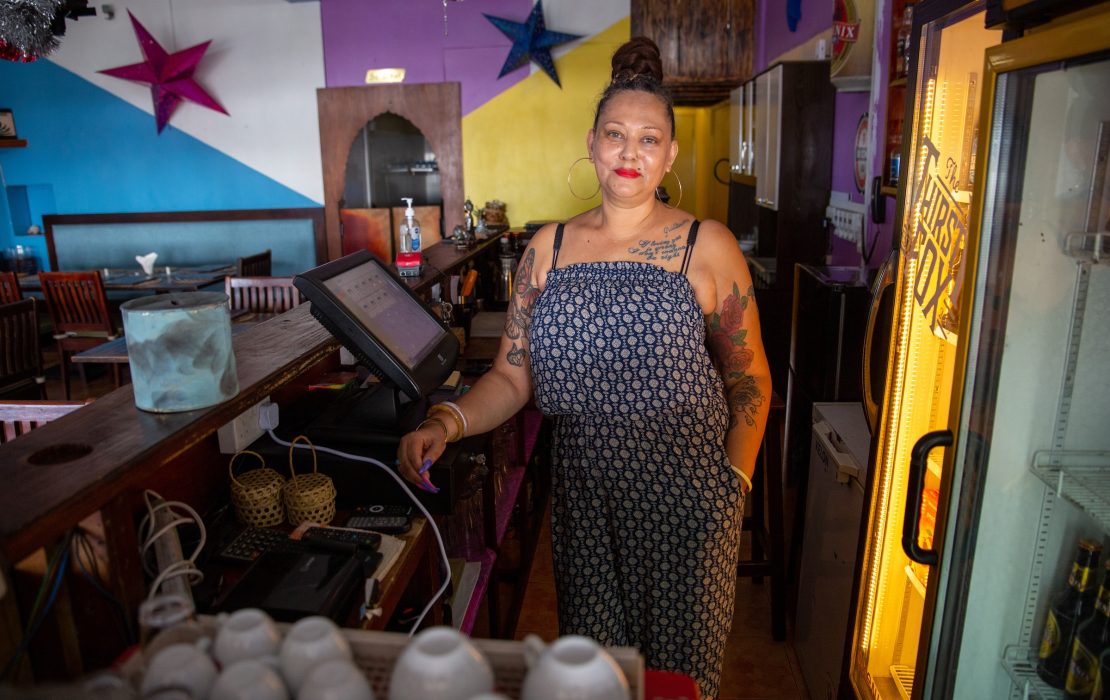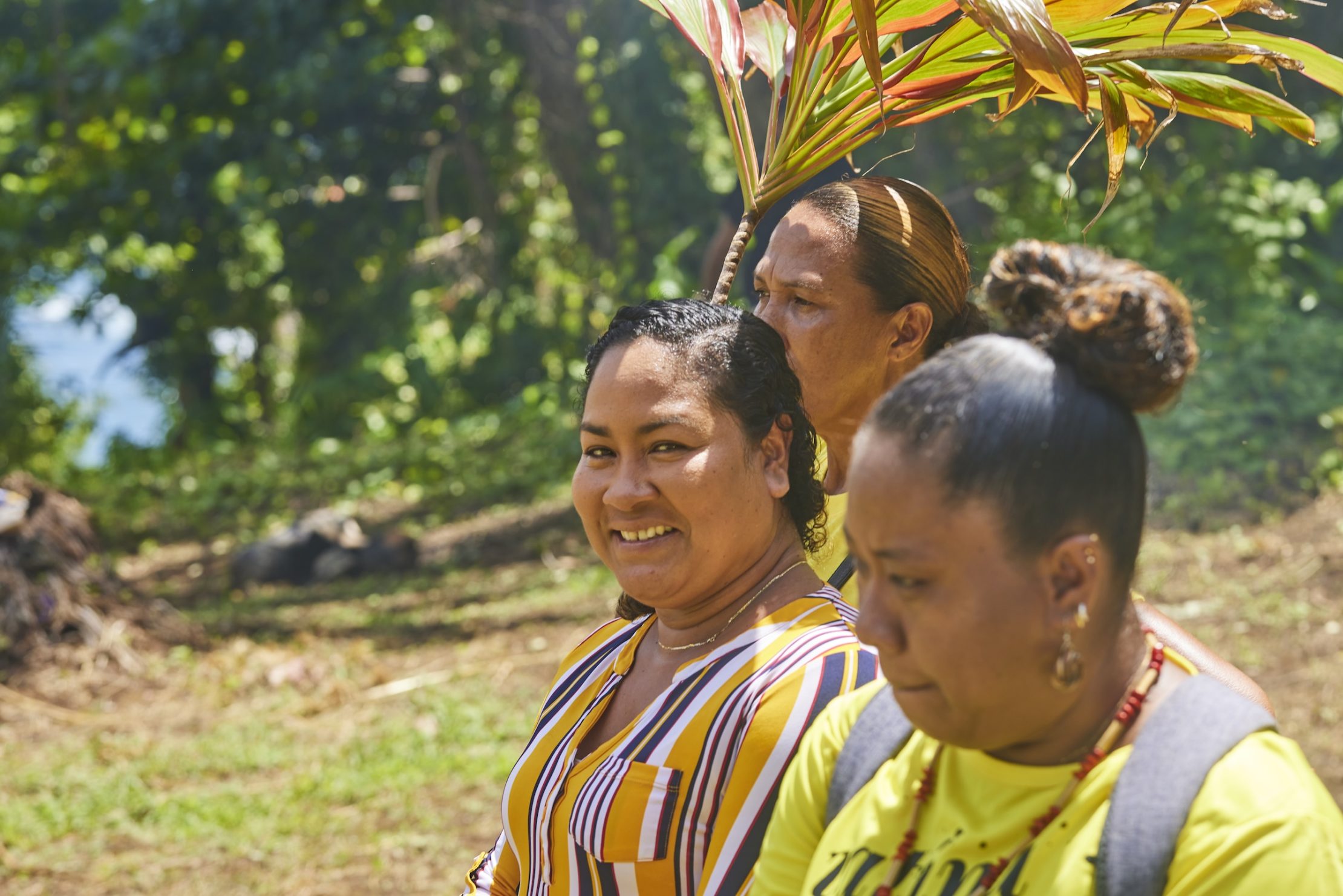
Women of the Kalinago indigenous community in Dominica. Photo: Marica Honychurch
According to the World Meteorological Organization, the 2021 Atlantic Hurricane season had the third-highest number of named storms on record and was the sixth consecutive above-normal Atlantic hurricane season.
As Small Island Developing States, or SIDS, Caribbean countries feel the effects of climate change first hand.
Small island states contribute to only 1 percent of the global greenhouse gas (GHG) emissions that are causing the climate crisis. Yet, they face some of the worst impacts of climate change, among them, more frequent and powerful storms and weather events, rising sea levels, ocean acidification, and biodiversity loss.
These effects come with incalculable human loss, and substantial development and economic costs. A 2020 study found that climate change damages in the Caribbean are projected to increase from 5 percent of GDP in 2025 to more than 20 percent of GDP by 2100 if no regional action is taken to mitigate or adapt to climate change.
Irreversible ocean warming and acidification are also having direct impacts on biodiversity, tourism, and coastal livelihoods. Projections are that 70-90 percent of tropical coral reefs, which provide close to US$6.2 billion in benefits to the Caribbean region each year, could die by mid-century. For the estimated 41 million people in the Caribbean that are highly dependent on reefs for their food and/or livelihoods, this is a grim fate.
To address these often irreversible impacts, SIDS and Least Developed Countries are pushing for ‘loss and damage’ considerations at COP27 in response to the unequal consequences of the climate crisis.
In spite of the serious challenges they face, or precisely because of them, Caribbean countries and their people are showing great resilience and leadership when it comes to climate action.
"There can be no period of long rest for us in small islands, as the climate crisis proceeds with unabated force."
— Ambassador Aubrey Webson, Chair of the Alliance of Small Island States (AOSIS), Permanent Representative of Antigua and Barbuda to the UN.
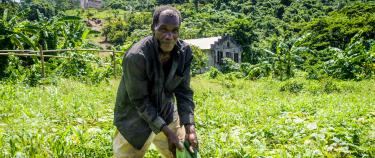
Photo credit: UNDP/Shani Leacock
Nationally Determined Contributions provide investment roadmaps to advance climate action in the Caribbean
Caribbean countries are at the forefront of the climate crisis, but they are also at the forefront of climate solutions.
From promoting blue economy frameworks to focusing on an inclusive and just transition to clean energy, these island states are stepping up to shape a green and more sustainable future.
Nationally Determined Contributions (NDCs), countries' climate commitments under the Paris Agreement, provide an opportunity to set more ambitious national goals and plans that support low-carbon and resilient development pathways.
Here we highlight four countries in the Caribbean taking bold climate action:
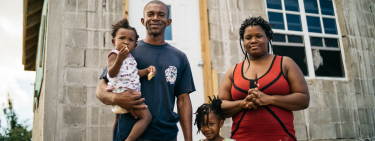
Photo credit: UNDP/Michael Atwood
Antigua and Barbuda
Focusing on a green and just transition
Antigua and Barbuda relies heavily on imported fossil fuels for electricity generation, cooking, transport, and commercial activities. Fossil fuels constitute 96.5 percent of its energy mix, representing a great burden for the country’s economy.
As a solution, the Government has been focusing on transitioning to green energies, such as wind, solar and biomass, in a just and sustainable way.
To achieve this goal, Antigua and Barbuda has set bold targets as part of its enhanced NDC and 2040 net-zero goal, including:
- Reaching 86 percent renewable energy generation from local resources by 2030 and 100 percent of new vehicle sales to be electric vehicles by 2030;
- Training 100 percent of the affected workforce to use new technologies for a green and just transition;
- Achieving a 20 percent increase in the number of women-led businesses focusing on renewable energy and climate adaptation initiatives; and
- Protecting all remaining wetlands, watershed areas, and seagrass bed areas as carbon sinks.
With support from UNDP’s Climate Promise and the NDC Partnership, as well as Climate Analytics, Antigua and Barbuda has undertaken a preliminary study that analyzed the employment implications of transitioning to a low-carbon economy, based on the country’s proposed NDC targets in the electricity and transport sectors, and made recommendations for developing a policy framework that supports a just transition.
UNDP, in partnership with the International Labour Organization, has supported national consultations to promote social dialogue on just transition. These dialogues were opportunities for meaningful discussion among participants and regional and international development partners with the intent to share learning experiences and promote collaboration to achieve the NDC targets.
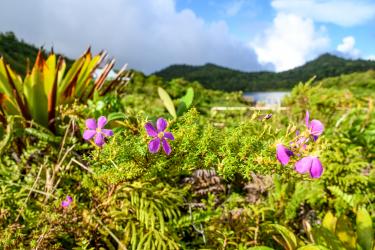
Photo credit: UNDP/Zaimis Olmos
Dominica
Switching to clean energy and scaling up forestry conservation
In 2017, category five Hurricane Maria made landfall on the island of the Commonwealth of Dominica. Nearly 80 percent of the population was directly affected and more than 90 percent of roofs damaged, power and water supplies disrupted, and entire crops destroyed. It was the most extreme hurricane to ever impact the island, causing damages amounting to over US$1 billion, or 226 percent of its GDP.
Relying on agriculture and tourism to sustain livelihoods, Dominicans understand the importance of having resilient systems in place that can withstand climate impacts while also supporting a quick recovery.
Dominica aspires to become the first climate-resilient country in the world. It has made resilience one of its three NDC pillars, together with mitigation and adaptation.
With UNDP’s Climate Promise support, Dominica reviewed its NDC and submitted an update in July 2022. The country committed to more robust, clearer, and more ambitious goals than in its first NDC, including:
- An emissions reduction target of 45 percent below 2014 levels by 2030;
- 100 percent renewable energy usage by 2030;
- A 10 percent reduction of hydrofluorocarbons (HFC) emissions by 2030; and
- A 980 percent increase in carbon sequestration above 2018 in the land use, land use change and forestry sector.
To achieve these targets, the country is exploring the potential of geothermal energy and other alternative sources of energy, such as biomass and waste, and stepping up efforts on forest conservation. An assessment supported by the Climate Promise has shown that Dominica has the potential to replace up to 16 percent of electricity from fossil fuels by using biomass and biofuels.
Importantly, the country has also prioritized gender equality in its climate action and recognized the needs of the youth and indigenous communities. This includes developing a roadmap to mainstream gender in NDC institutional and coordination mechanisms.
“The role for the private sector, indigenous people, the youth is one of participatory action. It has to be one that involves a discourse that moves beyond the Government institutions…they must be involved in the conversation.”
— Cozier Frederick, Minister for the Environment, Rural Modernization and Kalinago Upliftment of Dominica.
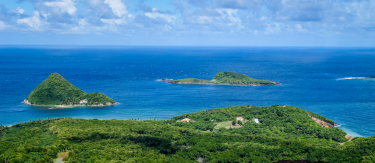
Photo credit: UNDP/Shani Leacock
Grenada
Implementing a National Cooling Action Plan
Grenada is known as the “the Spice Isle” for its historical wealth of nutmeg, allspice, clove and cinnamon farming. Highly dependent on natural resources, Grenada is seeking to diversify its economy and has been shifting to one that also focuses on tourism, real estate, education, and construction. Nonetheless, the country’s economy has taken serious hits from extreme weather events exacerbated by climate change.
As Mr. Simon Stiell, former Minister of Environment and current Executive Secretary of the UNFCCC, explained: “Grenada hadn't experienced a hurricane for close to 50 years and then in the space of just 10 months two hurricanes pass through, devastating the island.”
Grenada’s contribution to global GHG emissions is negligible. But in 2020, the country submitted an ambitious second NDC, which included:
- A goal of 40 percent reduction of the 2010 emissions levels by 2030;
- Inclusion of fluorinated gases (F-gases), that are used in air-conditioning and refrigeration, and consideration of the cooling sector under its mitigation targets; and
- New areas, including social inclusion, disaster risk reduction, health, and loss and damage.
As part of these efforts, Grenada has created a National Cooling Action Plan, with the aim of reducing emissions from the refrigeration and air-conditioning industry, which contribute to nearly 30 percent of the country’s GHG emissions.
Through the Climate Promise, UNDP supported Grenada to produce a financial plan that outlines the costs associated with the implementation of the National Cooling Action Plan and to conduct a renewable energy assessment of agriculture facilities. These measures are in support of the country’s pledge to further reduce its emissions and transition to greener sources of energy.
The Government of Grenada is also emphasising the inclusion of youth perspectives on climate action and prioritising education efforts that will support effective and sustainable climate action.
“Working with the Ministry of Education to ensure that we can communicate the message of change, and the message of transformation and change of behaviour with young persons at the primary school level, secondary school, level, and also tertiary level will help us change the communication about implementation.”
— Merina Jessamy, Permanent Secretary, Ministry of Climate Resilience, the Environment and Renewable Energy.
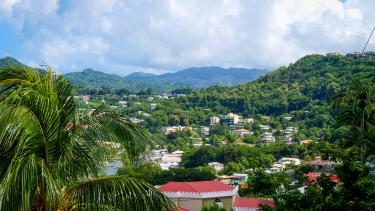
Photo credit: UNDP/Shani Leacock
Saint Vincent and the Grenadines
Empowering women for effective climate action
St. Vincent and the Grenadines is a multi-island nation consisting of 32 islands. Women represent 44 percent of the workforce –compared to 55 percent men– while 30 percent of women are unemployed, twice the national unemployment rate.
The country is already extremely vulnerable to the impacts of climate change, however, these impacts are not felt equally across the population. Gendered social differences mean women have increased vulnerability to climate change relative to men, and experience gender-differentiated impacts.
SIDS around the world, including Saint Vincent and the Grenadines, are recognizing that addressing gender gaps and empowering women is crucial for effective and sustainable climate action.
The country submitted its first NDC in June 2016. Supported by Climate Promise, the Government updated its NDC through an inclusive and sector wide consultation. The update, which is to be submitted to the UNFCCC in the future, includes:
- The development of a national Energy Action Plan;
- The inclusion of a mitigation assessment;
- Plans for the installation of a geothermal electricity generation facility, that could provide over 50 percent of the country’s electricity needs; and
- Initiatives to improve energy efficiency in buildings and transport, as well as reduce emissions from waste.
In collaboration with the EnGenDER initiative, Saint Vincent and the Grenadines collected and analyzed data on social inequities and how climate change will impact men, women, and vulnerable groups. The analysis highlighted gaps, opportunities and challenges and recommended inclusive policies and plans to build climate resilience. This information allowed the country to prepare a roadmap to guide and enhance the consideration of gender across NDC actions and plans. This includes improving the collection and use of sex-disaggregated data at the sectoral level and raising awareness about gender budgeting within the national budgetary process.
“It is necessary for all voices to be heard. Inclusivity is important as the entire society is affected by climate change and it is the vulnerable groups that are mostly affected in the worst way.”
— Tessa Mandeville, Environmental Specialist.
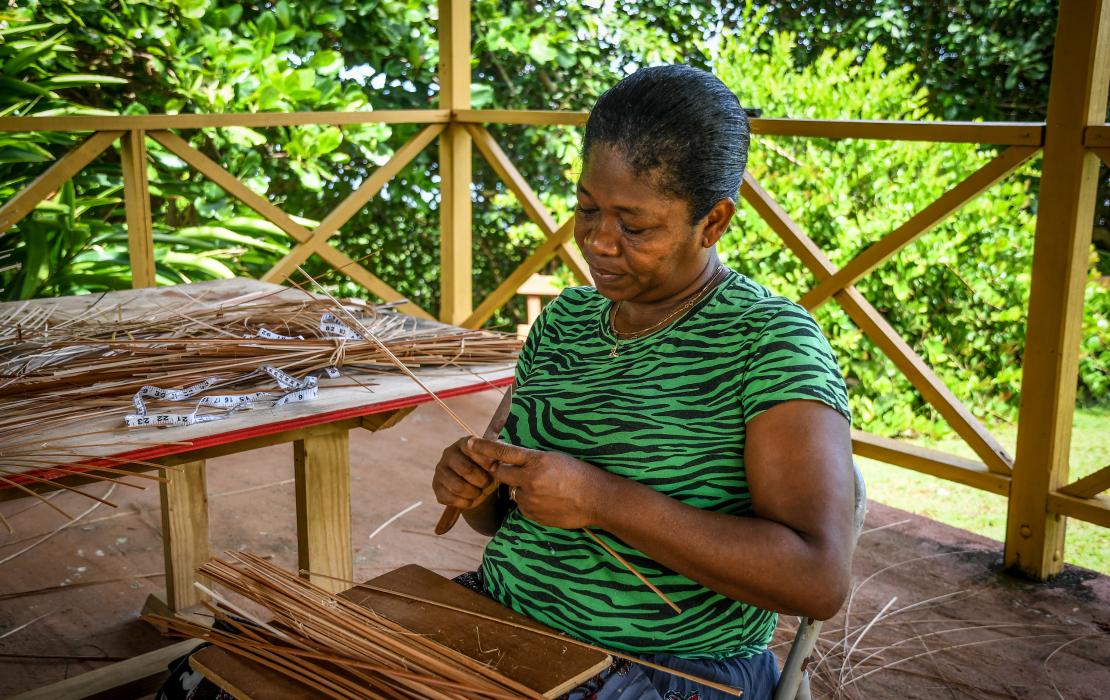
Photo credit: UNDP/Zaimis Olmos

Photo credit: UNDP/Zaimis Olmos
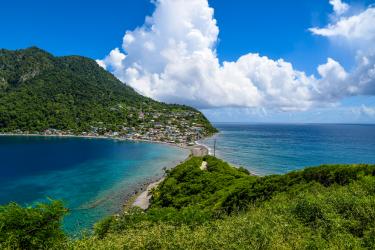
Photo credit: UNDP/Zaimis Olmos
For these Caribbean countries, which are among some of the world’s lowest emitters, it is evident that the cost of inaction is higher than the cost of action.
Countries in the region are taking bold measures to revert the current trends. But they cannot act alone.
Tackling the climate crisis will require a global effort and greater commitment by larger emitters to play their part: reducing their own emissions, supporting climate finance, and committing to a solution for loss and damage.
Explore More Stories
The COVID-19 pandemic brought significant challenges to the Caribbean twin-island state of Antigua and Barbuda.
